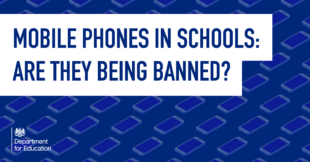
By the age of 12, 97% of children own a mobile phone, but the use of mobile phones in school can lead to distractions, disruption and can increase the risk of online bullying.
We also know that technology can bring many benefits to children’s education, but it’s crucial that pupils stay engaged in their learning to ensure high and rising standards in schools. Phones have no place in classrooms.
Are phones allowed in schools?
Most schools have already introduced rules which prohibit the use of phones at school, to help children focus on their education, and the friends and staff around them.
We have issued guidance which encourages all schools to follow this approach, so that more pupils can benefit from the advantages of a phone-free environment.
Are you banning mobile phones in schools?
An outright ban of phones in schools isn’t necessary because headteachers already have the power to ban phones in school. Most have chosen to do so.
Our guidance says that schools should prohibit the use of mobile phones, but it’s right that school leaders make decisions about what works for their individual settings. The current system means schools will be able to choose an approach to prohibiting mobile phones which suits them.
Some may allow phones to be brought onto the premises but not to be used during school hours, including at breaktime.
This brings England in line with other countries who have put in place similar rules, including France, Italy and Portugal.
Do some children need phones in schools?
The guidance sets out that there will be some limited cases where pupils should be exempt from the rule.
While the majority of pupils won’t be allowed to use their mobile phones during the school day, we know that some children need their mobile phones for medical reasons, or because they have special educational needs and/or disabilities or caring responsibilities.